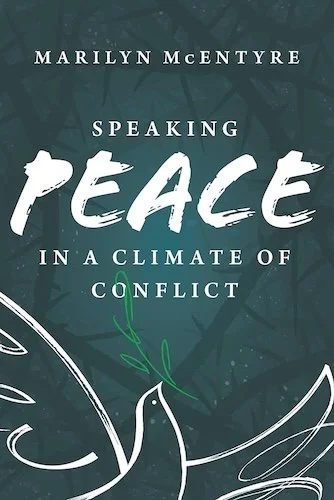Speaking Peace in a Climate of Conflict
I’ve written before about my appreciation for the work of Marilyn McEntyre, especially Caring for Words in a Culture of Lies. It really is one of my all-time favs. I’m pleased to report that Speaking Peace in a Climate of Conflict (Eerdmans), a sequel of sorts, does not disappoint. Neither book could be more timely, more winsome—nor more urgently needed.
Here’s how McEntyre describes what she’s up to in Speaking Peace:
In these pages I offer reflections that have emerged from my own work with words as a reader and writer and teacher, but also from my growing concern about what is happening to words as more and more of them become contaminated and turn into “triggers,” as lies go unchallenged and honesty goes unrewarded—or is punished. I have tried to identify a number of strategies for maintaining clarity, integrity, and authenticity in the midst of the morass . . .
She does this by engaging with the ideas and words of a range of writers whose work has shaped hers—a sort of “conversation” that can sharpen our own perceptions about the ways we are called to steward words in the particulars of our day-to-day lives. Conversation partners here include Wendell Berry and Dietrich Bonhoeffer, Naomi Shihab Nye and Mary Oliver, Brian Doyle and Arundhati Roy.
Midway through this book a couple of weekends ago, I had an opportunity to put some of McEntyre’s insights about “speaking peace” into practice. I found myself in a text exchange—about politics, heaven help us—with an old friend, someone with whom I rarely see eye to eye.
He asked me what I thought of a polarizing senator from the Midwest who, like many of our fellow citizens, has undergone an ideological evolution in the past five to ten years. I told my friend that while I had once admired this public figure’s nuanced perspective on some things, it seems to me he has more recently embraced grievance as a cynical strategy for winning votes, truthfulness and empathy be damned. I continued by saying that I don’t see any sign that the senator’s proposals, such as they are, will make any tangible difference in the lives of the constituents he was ostensibly elected to serve.
My friend, I wasn't entirely surprised to learn, is impressed by this new version of the senator—and other political figures who espouse similar views. The conversation that began with that first question carried on into the following week. I asked him questions about his perspectives, and he spoke his mind. In all of our give and take, it didn’t seem to me that he was holding back. And yeah, some of what he said I found alarming.
Because our friendship goes back, because we’ve withstood fierce disagreements before—I recall a heated exchange twenty years ago in a car—I knew our friendship would survive this one too.
Don’t get me wrong. I wish my friend would change his mind about vital matters of the common good. I wish he’d be more discerning about his sources of news, less easily persuaded by unscrupulous men with loud voices.
But let’s be honest, I know I flabbergast him too. It can’t be easy being friends with someone who sees the world so differently, who is temperamentally (if not exactly politically) wired in opposite, often incomprehensible ways.
When the text exchange had run its course, I wrote, “Love you man.” He replied with a kissy face emoji and said, “Hey at least we can hammer this out and not hate each other. I know lots who can’t!”
Indeed.
We’re in for a doozy of a year, all of us, following many doozies of years now. The problems run deep, and disagreements deeper still. It’s all rather frightening a lot of the time. And I don’t pretend to know the way out, except to say that people like me and my friend need to stay in each other’s lives with something approximating mutual care and respect. We need to keep talking despite everything—and everyone—conspiring to tear us apart.
The words we use in our friendships matter. We need to speak truthfully to each other, as truthfully as we possibly can. And so far as it depends on me and my words, to seek shalom.
